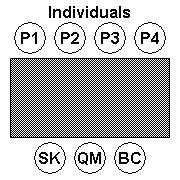Quiz League of London
The Quiz League of London (QLL) is a British quiz league based in London. Founded in 1990 as the Quiz League of South London, it was southern England's first independent self-administered quiz league. The matches themselves are mostly hosted at pubs or social clubs, though the COVID-19 pandemic has forced the league to play its matches online.
History
The QLL has since incorporated many teams from the Greater London area, and currently (2019–20) has two divisions of ten teams each plus sixteen teams in division three split into two conferences of eight teams each. The QLL runs the annual London Open Quiz Festival, which features a knockout competition between other quiz leagues from up and down the country and an annual open buzzer quiz using the University Challenge format.
The QLL also runs a President's Cup league competition aimed at the top players, a Summer Friendly League designed to be a bit less challenging, a knockout Cup and Plate competition, the Brain of London (an individual competition using the MIMIR format), a charity night, and a summer social. Players in the QLL include previous Mastermind, Brain of Britain, and Only Connect winners and other television and radio quiz winners. The only founder member club of the original four teams extant in the QLL is Atletico (original name being Manor Arms).[1]
Team format
Two teams, one home, one away play each other, responding orally to a questionmaster.

The QLL format consists of 64 questions in 8 rounds of 8 questions each asked to individuals on the teams alternately. Correctly answering your own question scores 2 points though it can be passed within the team (if the player chooses not to answer) or over to the other team (if the player or team answer wrongly or choose not to answer) for one point.
In the QLL format, there is no conferring as such. Where a player decides not to answer their question, the team captain will normally decide which other member of the team is to answer. The opposition will also decide who is to answer the question in the event of it being passed over. After 4 rounds, the order of answering changes so the team who began round 1 going first begin round 5 going second. This is done by switching each team's questions from A to B or from B to A depending on which questions they started with.
In league competitions, a win scores four points, a draw scores two points and a close defeat (losing by three points or fewer) scores one point. In addition, if all four members of a team get all of their own questions correct in any given round (a "full house"), an additional bonus point is scored.
In knockout competitions where a draw is not permitted, an additional ninth round of questions is played. If the scores are still tied at the end of the ninth round, a tie-breaker is played.
Individual format

Many quiz leagues run individual competitions. QLL's uses the MIMIR quiz format (named after Mímir, a god of Norse mythology who was renowned for his knowledge and wisdom). Matches are played in groups of four with positions drawn at random and each person has 3 questions addressed to them, in each of 5 rounds.
Time to answer is at the discretion of the question master but a wrong answer or a pass gives any of the other three an opportunity to score a bonus point. The decision as to who gets the first chance to answer for a bonus is determined by offering the question to whoever, at that stage, has made fewest attempts to gain bonus points or, if there is more than one player who has made the fewest bonus attempts, the next player in line (e.g. if this happened on the first question, P2 would have the first option on a bonus attempt). As well as a scorekeeper, a bonus counter is needed to track each player's bonus attempts.